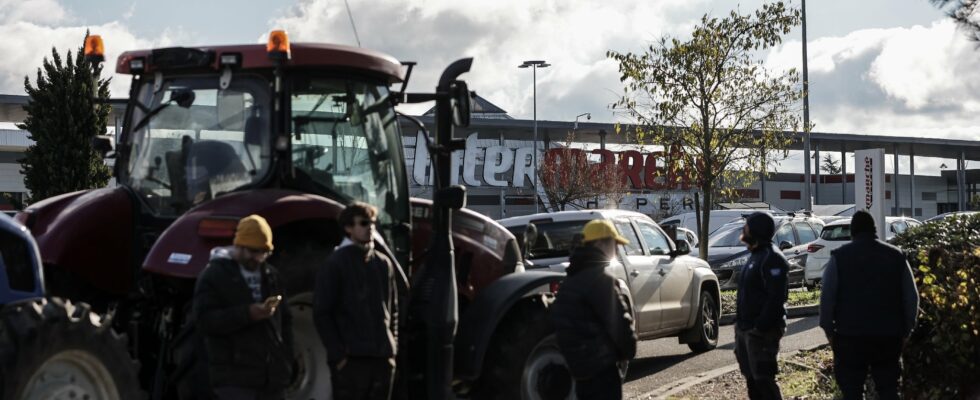Mercosur, the “impediments”, the “standards”… So many subjects likely to ignite the powder. It is in a tense climate, with their professional elections approaching, that farmers are preparing to enter a second week of mobilization. Although they protest in dispersed order, they are determined to maintain pressure on the government. Less than a year after a historic mobilization and after a “rotten summer” marked by poor harvests and an outbreak of emerging animal diseases, the agricultural unions brought out the tractors, believing that they had not obtained enough concrete progress in the farmyard.
After a first week of mobilization against the free trade treaty that the European Union is negotiating with Latin American Mercosur countries, actions should broaden to denunciation of the “impediments” to production denounced by the majority alliance FNSEA-Young Farmers (JA) as well as its competitor Rural Coordination (CR), the 2nd agricultural union. The president of the FNSEA Arnaud Rousseau announced new actions with the JA “Tuesday, Wednesday and Thursday” to “denounce the obstacles to agriculture and everything that today constrains our activity”.
After symbolic actions – fires of anger, rallies – claimed in 85 departments, the actions will target, for example, prefectures, water agencies or the office of the French Office for Biodiversity (OFB). “Almost all departments plan to take action in the coming days,” warned the JA. On Sunday morning, 37 farmers with 9 machines mobilized during two actions, according to the authorities, who clarified that no incident was to be deplored.
Insecticides, administrative simplification…
Following the FNSEA’s credo – “No ban without solution” – the demonstrators will notably defend the return of acetamiprid, an insecticide from the neonicotinoid family, demanded by hazelnut and sugar beet producers. Harmful to pollinators, it is banned in France but used in other countries of the European Union. Also among the demands: increased access to water and the simplification of the millefeuille of French and European standards, the efforts made by the government still being considered insufficient.
The Rural Coordination, which has multiplied its splashes in recent days, plans to “amplify” its mobilization beyond the South-West where its latest actions have been concentrated. After a filter barrier at the Spanish border, the blockade of the commercial port of Bordeaux or a muscular intrusion into an office of the OFB, of which it demands the “dissolution”, the union announced a rally on Tuesday in front of the European Parliament in Strasbourg . Also on the menu this week: a ditch cleaning operation in the Hautes-Alpes. Purchasing centers remain privileged targets like those of Alby-sur-Chéran and Rumilly, the blocking of which was announced, on Facebookfrom 9:30 a.m. this Monday by the Rural Coordination of the two Savoies.
Opposed for decades to free trade, the Peasant Confederation, heir to the anti-globalization peasant struggles, continues its mobilizations against Mercosur and “for the defense of peasant income” and the agro-ecological transition. She plans in particular a mobilization in a supermarket in Essonne on Monday and an anti-Mercosur action in Dordogne on Tuesday. Still in the Dordogne, various convoys plan, this Monday, to converge towards the prefecture around 4 p.m., at the initiative of the FDSEA and the Young Farmers who want to say “welcome” to the new prefect of the Dordogne who takes up these functions this Monday morning, according to France Blue.
In the background, the union elections
Apart from the demands, the tension between the unions is palpable on the ground. On Friday, the tone suddenly rose between the FNSEA and the Rural Coordination, of which around fifty members from its stronghold of Lot-et-Garonne disrupted a trip by Arnaud Rousseau to Agen. In an electric atmosphere, the activists in yellow hats booed the boss of the FNSEA and threatened to prevent him from leaving, before letting him return to his vehicle under police escort. The president of the FNSEA, in a statement to AFP, deplored “lamentable methods” and “not acceptable threats”, believing that this search for “escalation” or “buzz” did not “advance the agricultural project.
This confrontation comes a few weeks before the vote to elect the departmental chambers of agriculture, at the end of January 2025. This vote, which takes place every six years, draws the political balance between the different union organizations. The Rural Coordination, which currently chairs three, including that of Lot-et-Garonne for two decades, hopes to break the hegemony of the FNSEA-JA alliance and capture “15 to 20 additional rooms”. In Dordogne for example, the Rural Coordination emerged strengthened from last winter’s mobilization with a number of members multiplied by seven, recall our colleagues from France Inter.
In this tense climate, where the risk of overbidding is scrutinized by political observers, the government ensures that France is making progress in building a blocking minority in the EU-Mercosur agreement: after Italy, it is the Poland expressed its rejection on Friday. A debate followed by a vote on this free trade treaty, which France rejects as it stands, is planned in the National Assembly on November 26. And the French Minister of Agriculture Annie Genevard promised to tackle the issue of banned pesticides and new announcements in the coming days on “simplification”. It remains to be seen whether the government will succeed in extinguishing rural anger.
